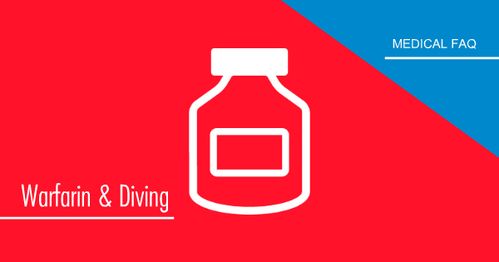Blood Thinners

My doctor has started me on Warfarin (Coumadin). How will this affect my diving?
A diver who has been prescribed an anticoagulant, e.g., Coumadin® or Warfarin®, should be warned of the potential for bleeding: excessive bleeding can occur from even a seemingly benign ear or sinus barotrauma. There is a potential risk that, if decompression illness occurs, it may then cause significant bleeding in the brain or spinal cord. The diver must be able to equalize without difficulty. Also dive physicians would recommend conservative dive profiles to help further reduce the risk of DCI.
Posted in Dive Safety FAQ
Categories
2025
2024
February
March
April
May
October
My name is Rosanne… DAN was there for me?My name is Pam… DAN was there for me?My name is Nadia… DAN was there for me?My name is Morgan… DAN was there for me?My name is Mark… DAN was there for me?My name is Julika… DAN was there for me?My name is James Lewis… DAN was there for me?My name is Jack… DAN was there for me?My name is Mrs. Du Toit… DAN was there for me?My name is Sean… DAN was there for me?My name is Clayton… DAN was there for me?My name is Claire… DAN was there for me?My name is Lauren… DAN was there for me?My name is Amos… DAN was there for me?My name is Kelly… DAN was there for me?Get to Know DAN Instructor: Mauro JijeGet to know DAN Instructor: Sinda da GraçaGet to know DAN Instructor: JP BarnardGet to know DAN instructor: Gregory DriesselGet to know DAN instructor Trainer: Christo van JaarsveldGet to Know DAN Instructor: Beto Vambiane
November
Get to know DAN Instructor: Dylan BowlesGet to know DAN instructor: Ryan CapazorioGet to know DAN Instructor: Tyrone LubbeGet to know DAN Instructor: Caitlyn MonahanScience Saves SharksSafety AngelsDiving Anilao with Adam SokolskiUnderstanding Dive Equipment RegulationsDiving With A PFOUnderwater NavigationFinding My PassionDiving Deep with DSLRDebunking Freediving MythsImmersion Pulmonary OedemaSwimmer's EarMEMBER PROFILE: RAY DALIOAdventure Auntie: Yvette OosthuizenClean Our OceansWhat to Look for in a Dive Boat
2023
January
March
Terrific Freedive ModeKaboom!....The Big Oxygen Safety IssueScuba Nudi ClothingThe Benefits of Being BaldDive into Freedive InstructionCape Marine Research and Diver DevelopmentThe Inhaca Ocean Alliance.“LIGHTS, Film, Action!”Demo DiversSpecial Forces DiverWhat Dive Computers Don\'t Know | PART 2Toughing It Out Is Dangerous
April

6 Comments
Hi My name is Fanus,i have a pulmonary embolism and have been put on warfarin for life,what is the chances of ever diving,the clot use to be in my heart but has since my last checkup been disolved or who knows what happened to it,but mri,brain eeg,blood analysis checks out perfect,i have been on many blogs where people dive with smilar conditions as mine,i have honestly never heard of any warfarin or pe or dvt related incidents,what do i have to do,i have even cut myself in water out of water,sharpening knives scrapes,nothing is out of the ordenary,bleed like normal and it stops like normal,if i don't have any problem with it,why can't i dive,does the oxygen in the cylinders have any negative effect on warfarin users?i snorkel and long sessions at a time and i love going under water
Hello,
I am looking for statistics on the use of Warfarin in South Africa. Do you think this is a common drug used in your country? The reason I'm asking is because Warfarin causes side effects and those side effects arn't showing up in South Africa. If you know anything about the use of this drug in your country, please could you reply to me.
Thank you very much
My mother takes a blood thinner called Riveroxaban which is supposed to be better than Warfrin but its still an anti anticoagulant meaning, its highIy likeIy to produce the same side effects.
Regards.
Fiona Williams
We are pleased that you took the time to comment on the blog post. Dr Cronje has created a video response which is now available via the blog post and via the DAN Southern Africa You Tube channel - https://www.youtube.com/watch?v=zsDlumDFqMM
I hope this answers your question.
Dear Dan,
A question: I'm on warfarin as my blood clots to easily and I had a stroke on 24 September 2006.
I had done 136 dives and was a NAUI DM at the time, but stopped diving while on warfarin
I then got off warfarin, with the doctor prescribing an aspirin a day, but I then needed to go back on warfarin as the haematologist wasn't happy with my bloods (d-dimer to high), but I do have permission to dive if I take a week off warfarin prior to diving, and have done 35 dives since (171 total).
However, I would like to get a second opinion and advise, please. I believe I should stay on warfarin, and dive.
What is your advise?
Regards,
Gavin
Thank you for your question.
The warfarin self is not a contraindication to diving unless your PI/INR level is above 3.5.
One has to consider the underlying Diagnosis for taking the Warfarin. Having had a stroke/CVA before, one needs to look at the cause of the stroke. Many causes of stroke can also lead to other cardiovascular diseases, like heart attack. This will require a full cardiac check, including Effort ECG and possible cardiologist referral.
Other causes of stroke can be due to arrhythmias/Atrial fibrillation that can recur if not taking either Warfarin or other NOACS drugs.
The advice is to consult a Diving Physician to look at your fitness to dive.
The DAN medical team